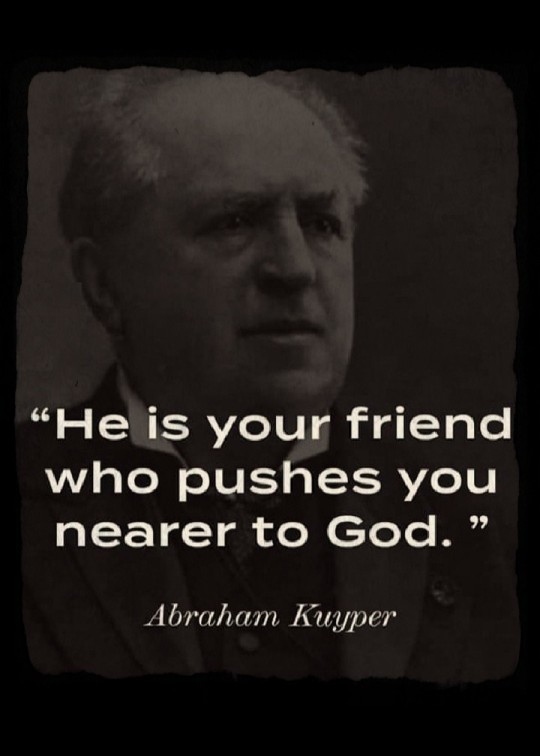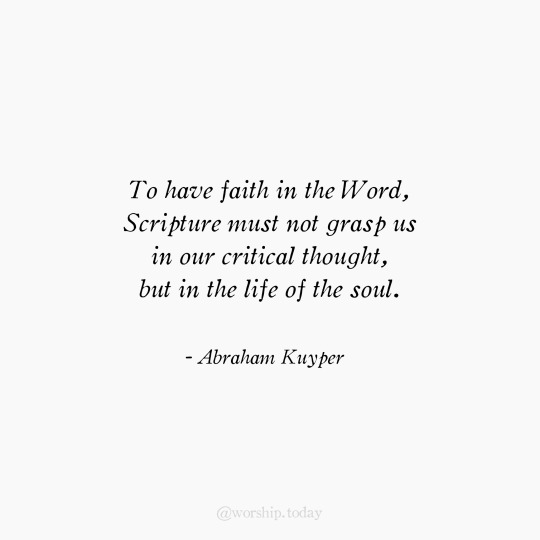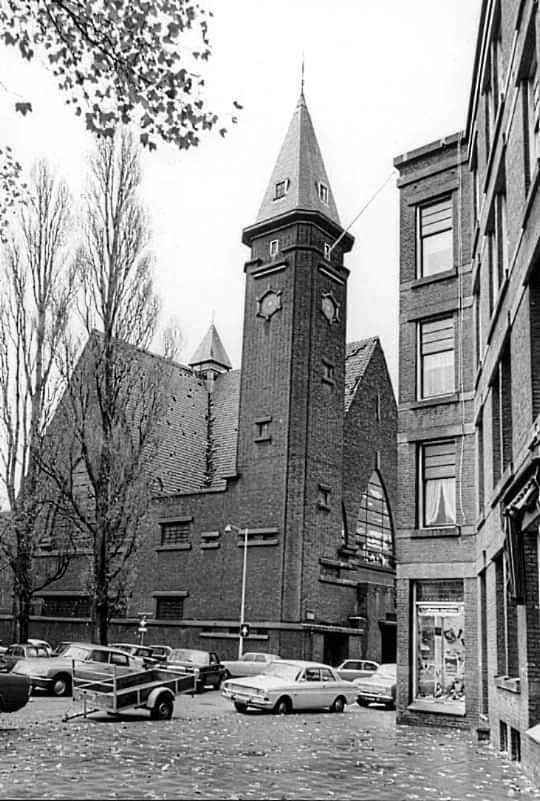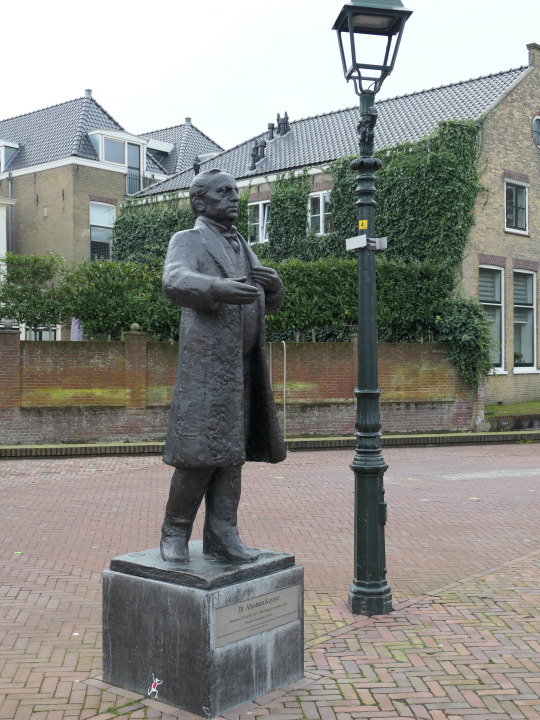#Abraham Kuyper
Quote
It is not your idea, not your understanding, not your thinking, not your reasoning, not even your profession of faith, that here can quench the thirst. The home-sickness goes out after God Himself... it is not the name of God but God Himself whom your soul desires and cannot do without.
Abraham Kuyper
125 notes
·
View notes
Text

_"Adalah temanmu siapapun dia yang mendorongmu makin dekat pada Allah."_ ~ Abraham Kuyper, teolog, jurnalis, dan eks-Perdana Menteri Belanda.
0 notes
Text
"Só quem te empurra para mais perto de Deus é seu amigo."
– Abraham Kuyper
#projetofalandonocéu#compartilharemos#frases#vida cristã#projetoalmaflorida#projetoescritores#frases evangélica#amor#mensagens#jesus está voltando
179 notes
·
View notes
Text
Christian Take on the Southern Raiders
As a Christian, I wanted to examine Katara's desire to pursue her mother's killer in the Southern Raiders episode. Especially the topic of forgiveness and justice.
Was Aang right about forgiveness?
Aang claims Katara has a second choice: forgiveness. Zuko claims forgiveness is the same as doing nothing. Aang responds:
"It's easy to do nothing. It's hard to forgive"
Aang is 100% right. Forgiveness is hard. Even when the slight is minor, forgiveness can be hard. Aang is also right about revenge. Revenge can poison someone beyond repair. Forgiveness is meant for the victim, not the perpetrator. As Christians, we can not be forgiven by God if we can't forgive others. In secular terms, forgiveness sets you free from the shackles to your tormentor. So as a friend, Aang is right for pointing this out as an option.
HOWEVER, how he goes about it is insulting and condescending. Comparing the death of Katara's mom to losing Appa temporality. I know Appa is one of his last links to his culture but Appa is an animal and comparing him to a mother is disrespectful! And comparing her to Jet. Another issue here is that Aang presents confrontation as mutually exclusive from forgiveness. At least initially. For me, I struggle to truly forgive unless I confront the person who hurt me first. He did validate her need to confront Yon Rha though when he confronted her and Zuko at night. So right idea but poor execution, Aang.
I think Aang may be a bit too demonized in this episode by Zu/Katara fans.
Justice vs revenge
So justice and revenge both involve addressing wrongs. However, Christians should not carry out revenge. We should leave punishment to God and the law. Justice is also tied to forgiveness. Any Christian who says that we should just forgive criminals and let them off the hook from the law is speaking nonsense. Shame on the Christian press who bashed Rachel Denhollander in her sexual assault case.
Zuko called Katara's desire justice. Aang called it revenge. Who's right?
What was Katara going to do?
What's interesting is that Katara does not explicitly specify what she will do when she confronts Yon Rha. Aang is the one who brought up seeking revenge. But even then no one outright says murder. Maybe because it's a kid's show or maybe Katara did not know herself. It's not until she goes for the kill that it is explicit that she wants to actually kill him. Although her wanting to kill him was heavily implied or could be inferred from the tone of the episode.
Is it revenge or justice to kill Yon Rha?
Technically, yes it is revenge. Justice is meant to be carried out by an impartial party (eg. the law) and/or someone with absolute higher power (God). It is an eye for an eye, but it is still revenge.
HOWEVER, Katara has no avenue for proper justice in the Avatar world! And Christianity does not exist in ATLA obviously lol.
ATLA has spirits but the spirits are indifferent to human problems. Tui and La or Agni will not avenge Katara like God promises to do for Christians.
There is a war going on and there is no law that will condemn Yon Rha. He was doing his duty as a fire nation soldier so he is not guilty under fire nation law. Katara could THEORETICALLY get justice by waiting for Zuko to be crowned and letting the new regime prosecute Yon Rha. But then it poses another problem! Zuko would be forced to prosecute who knows how many FN soldiers! Would all retired military leaders be sent to prison?? What if there was some super old guy who participated in the air nomad genocide and was on his deathbed, on the verge of croaking? Should he be carted off to jail?? And you can't (or shouldn't) lawfully prosecute someone for doing something that was not illegal at the time of the action.
If the WT captured him and held him accountable for murder under their law that could work.
Thankfully, Katara made what I believe to be the right choice for herself. Killing Yon Rha would not bring her mom back and probably would not bring her the closure she needed. There are things worse than death after all.
Even though Katara claimed she did not forgive Yon Rha, she did in a sense. By confronting him, she let go of his hold over her. She no longer fears him. She is able to move on and let go of her anger. She does not demand any payment from him by sparing his life because she sees him as a pathetic waste of space already. She found closure. The difference with her forgiveness of Zuko is that she chooses to put her animosity in the past and give him another chance. Reconcile with him. Unlike with Yon Rha. Not that there is anything to reconcile with him anyway...
#yon rha#the southern raiders#christianity#Rachel Denhollander#justice#revenge#forgiveness#atla katara#atla aang#aang critical#only a little bit#christian analysis of media#atla#atla meta#atla zuko#anti christians who demonize victims#forgiveness does not mean justice is not suppose to be served#kataang friendship#zutara friendship
76 notes
·
View notes
Text

*Devocional Diário.*
Quarta - Feira 03/04/24
*Tema:* Conhecimento
Salmos 119:66
Ensina-me o bom senso e o conhecimento,
pois confio em teus mandamentos.
🙏🏻 *Frases do Dia.*
Não ha nada na existência humana que Cristo não possa dizer: é meu. *Abraham Kuyper*
🌅 *Provérbios do Dia.*
Pv 3.5
Confie no Senhor de todo o seu coração e não se apóie em seu próprio entendimento.
📖 *Leitura Biblíca Diária.*
I Coríntios 6.12
Todas as coisas me são lícitas, mas nem todas as coisas convêm. Todas as coisas me são lícitas, mas eu não me deixarei dominar por nenhuma.
" *Deus é Fiel e abençoará a sua Vida hoje* "
14 notes
·
View notes
Text
He is your friend who pushes you nearer to God.
Abraham Kuyper
43 notes
·
View notes
Quote
He is your friend who pushes you nearer to God.
Abraham Kuyper
68 notes
·
View notes
Text
"Não há um centímetro quadrado deste mundo do qual Cristo não possa dizer: é meu."
Abraham Kuyper
4 notes
·
View notes
Quote
But, according to Hoedemaker, the Reformed had always held that there is no permissible coercion of conscience–freedom of religion is something entirely different from freedom of conscience. And here, absolute freedom of religion is impossible if one seeks to have a society. Citizens have individual freedom of religion, subject to what is required from public order, the freedom of others, and the character of the nation and its institutions, but one cannot use religion to overthrow the foundations of society. Some religion will always be recognized as the reference for truth in a given society; such a religion will be distinguished from others.
James Wood, on a contemporary of Kuyper. How Abraham Kuyper Lost the Nation and Sidelined the Church - Ad Fontes
2 notes
·
View notes
Text

"To have faith in the Word, Scripture must not grasp us in our critical thought, but in the life of the soul."
Abraham Kuyper
9 notes
·
View notes
Text
When principles that run against your deepest convictions begin to win the day, then battle is your calling, and peace has become sin; you must, at the price of dearest peace, lay your convictions bare before friend and enemy, with all the fire of your faith.
~ Abraham Kuyper
2 notes
·
View notes
Text
Taking Presuppositionalism's Gambit:
As imperial evangelicalism grows stronger in the US, the more relevant it will become to speak their language fluently in order to systematically deconstruct their authoritarian worldview the way they have been trying to deconstruct secularism, humanism, science, reason, and every other field of human knowledge and endeavor. The first thing to know about them is that they undertake this deconstruction in obedience to Paul's call to "destroy speculations and every lofty thing raised up against the knowledge of God, and we are taking every thought captive to the obedience of Christ" (2 Cor. 10.5)
This idea has a long pedigree in Calvinist circles since the theocracy of Calvin's own authoritarian Geneva. In its modern iteration, it comes from Abraham Kuyper, the father of the "Christian Worldview" notion. He has another name: the father of South African Apartheid. He believed this verse meant that only Christians should be in charge. He argued that since Jesus's Lordship extended to everything, including our thoughts, all other worldviews and all fields of knowledge should be in total submission to this Christian Worldview. He was elected Prime Minister of the Neatherlands in 1905--the Neatherlands are now so liberal a state in part due to throwing off the yoke of Kuyper's ideas.
Kuyper was brought to America in the 1920s when another Dutch theologian named Cornelius Van Til, the father of Presuppositional Apologetics, joined Westminster Theological Seminary in Philadelphia. Van Til is one of the most influential theologians almost no one has heard of. Everyone from Jerry Falwell to Francis Schaeffer to Ken Ham to the Gospel Coalition to Doug Wilson used his ideas or some mutation of them. This is why Van Til is the focus of this post.
I like to say that Van Til was the first postmodern Calvinist. His argument was this. All knowledge is filtered through a set of lenses that anchor our interpretations of the world into a system of thought, or philosophy. Moreover, all systems of thought, he said, have at their core an unprovable assumption we accept as an article of faith. Thus, the decision to adopt one assumption or another is fundamentally arbitrary. Humans are fundamentally good or bad is one such assumption. Science is the best and most effective means of understanding the world around us. Even, democracy is the best system of government. Everything.
If you've ever wondered where the idea that "atheism is a religion" came from, you can thank Van Til. All systems of thought accept an unprovable starting assumption (presupposition) on faith, and so are therefore religions, he argued.
Moreover, this presupposition controls our interpretation of the world. We all look through a set of lenses that "color" our view in particular ways. Thus, the starting point controls the conclusion, and therefore the system is caught in an unresolvable circular argument. You have assumed what you must prove. Thus, the Christian cannot be singled out for circular reasoning, and can freely embrace the circularity of assuming that God exists in order to prove God's existence.
Because of the Fall, he said, humans are caught in the wrong interpretive grid. We now assume our perspective is ultimate and that we are autonomous. But really, said Van Til, God's perspective is supposed to be ultimate and everyone must be in submission to it. Everything else is sin and setting yourself up to be God.
Therefore, you must switch your lens out for a pair of "Biblical Glasses." The leap of faith, then, is intellectual, in adopting the presupposition of the Christian Worldview, which then implicitly becomes identified with Christ. The Christian Worldview is ultimately His worldview, his perspective.
There are obvious problems with Presuppositionalism, but this is essentially a deconstructive postmodern Epistemology. Of course, by admitting the Christian Worldview is an interpretive framework, it invites it's own deconstruction. So instead of laying out the problems with Presuppositionalism, I want to assume it and thereby generate a theological starting point by which this "Christian Worldview" can be deconstructed from the inside out.
If our starting point is indeed taken as a leap of faith and if this starting point controls the rest of the framework, then I would like to choose a starting point under these terms.
I want to assert that Love must be our starting point. Van Til's starting point assumes the primacy of law; I assume the primacy of Love.
Van Til's starting point assumes a retributive God who metes out rewards and punishments in accordance to its primary virtue, Obedience, and its primary sin, Disobedience; I assume God is Love, and therefore retribution cannot be an aspect of God's character.
Van Til assumes God the Authority as his starting point: I begin with the Spirit, the divine energies of Love and the point of contact with the divine. This Spirit is the Spirit of Christ, and thus puts us in union with Christ, the Rabbi of Love, who is one with the Source of Love itself.
Van Til assumes a Patriarchal male God totally separate from its creation; I assume an egalitarian, democratic, and communitarian Trinity of mutual self-emptying and Other-filling Love.
Van Til assumes the Fall distorted our lens; I assume the Fall is an invention of the Western tradition and therefore we can trust our reason when tempered with Love.
This starting point has the advantage of being exactly what God is said to be in 1 John 4: "God is Love." Evangelicals are quick to say "this does not mean that love is God," but I ask, "Why not? Why are you so afraid of a God that is Love?" The "is" means identification and no exceptions are considered.
It also has an advantage in that in the discussion following the declaration that God is Love, the author of 1 John goes on to say that "Love is from God," that is, ALL love. And more, "everyone who loves is born of God and knows God" in the intimate sense of union. Anyone who lives a life of Love is in union with God. The context of the letter was false teachers, Anti-Christ, and how to identify them at the start of the chapter (1 John 4.1). So John is saying, "the way to identify God in the world is anywhere Love is present," and the cross is held up as the premier example (vv. 9-10). No one has seen God, but if we Love, God "abides" in us (v. 12) in the sense of union, and we know that we are saved (v. 13). It would seem retributive theology is a false doctrine.
And because God is Love, Paul's definition of Love in 1 Cor. 13 becomes our definition of God's character, and therefore is our starting point in developing any Doctrine of God. This definition explicitly excludes coercion of any kind since "Love does not insist on its own way" (1 Cor. 13.5). It also resolves the question of whether God is a jealous God: "Love is not jealous." Wrath is excluded, since "Love is not provoked." This God is also not someone who creates places like hell: "Love does not take account of a wrong suffered." This God is a universalist.
This starting point is also eternal. Tongues and rites and justice-doing will cease in the Eschaton, (v. 8), prophecy (taken broadly as interpreting the Bible and preaching) will cease, since we will have no need of church or sacrament or scripture when we are "face to face" with God unmediated. But God will endure, and therefore Love will endure (v. 8).
And without this starting point, our interpretation of Scripture will use a retributive lens. Without Love, church and rite and worship and preaching are worse than worthless (vv. 1-3). These things are also then relativized, in that anyone who exhibits Love is saved, inside or outside, because salvation is union with the God that is love.
This becomes the starting point for ethics: "Love does no harm to a neighbor." Harm here includes the physical, emotional, psychological, and spiritual. Jesus excludes verbal abuse in the Sermon on the Mount because it leads to violence; in fact he leads the Sermon with this principle (Matt. 5.21-22).
I could go on at a lot more length, and I will in the future, but this is probably more than enough to establish the value of Love as a starting point. By taking Van Til's structure and emptying it of its retributive gloss we are provided with a ready-made worldview with which to counter the cruel Christianity that seems so predominate in our time. I believe this is more important than ever before, because we will have to pick away at their support in the rank and file. They're already primed with worldview concepts, so speaking their language is a natural point of contact with them.
#christian#deconstructing#exvangelical#christian deconstruction#christian ethics#deconstructing christianity#God is Love#evangelical#Presuppositionalism#Van Til
4 notes
·
View notes
Text
De Tidemanstraatkerk in de Tidemanstraat, 1970-1975.
De Tidemanstraatkerk was een alleszins interessant, groot, karakteristiek Gereformeerd kerkgebouw met toren in Delfshaven (Rotterdam-West), ontworpen door architect Jos de Jonge. De eerstesteenlegging vond plaats op 17 september 1923 en de ingebruikname op 17 december 1924.
Het kerkgebouw met toren op de hoek van de voorgevel was opgetrokken in een sobere, expressionistische bouwstijl. Er bevonden zich 1200 zitplaatsen, waaronder op balkons. De liturgische indeling met banken rondom de kansel en orgel was beïnvloed door de opvattingen van Abraham Kuyper.
Buiten gebruik 1973, sloop 1975. In dit kerkgebouw bevond zich een in diverse opzichten uniek, groot orgel. Na sluiting van de kerk is het orgel gedemonteerd, en in het leegstaande kerkgebouw opgeslagen. Door vandalisme zijn vele delen van het orgel daarna vernield. Resterende delen zijn later nog gebruikt voor het orgel van de Gereformeerde Duyststraatkerk in Rotterdam-Delfshaven.
Deze straatnaam herinnert aan Joannes Tideman, 1807-1891, remonstrants predikant te Rotterdam 1830-1855. Daarna was hij hoogleraar te Amsterdam.
De fotograaf is Lex de Herder en de foto komt uit het Stadsarchief Rotterdam. De informatie komt van reliwiki.nl en uit het Stadsarchief Rotterdam.
Bericht van 2023

0 notes
Text
It is not your idea, not your understanding, not your thinking, not your reasoning, not even your profession of faith, that here can quench the thirst. The home-sickness goes out after God Himself… it is not the name of God but God Himself whom your soul desires and cannot do without.
Abraham Kuyper
13 notes
·
View notes
Text
Today in Christian History
Abraham Kuyper served as the Prime Minister of the Netherlands in the early 1900’s. An influential neo-Calvinist Pastor, Kuyper established the Reformed Churches in the Netherlands in 1892, merging into the Protestant Church in the Netherlands in 2004. Abraham was one of the most extraordinary men of the nineteenth century – a theologian, a linguist, a college professor, politician, stateman,…
View On WordPress
0 notes
